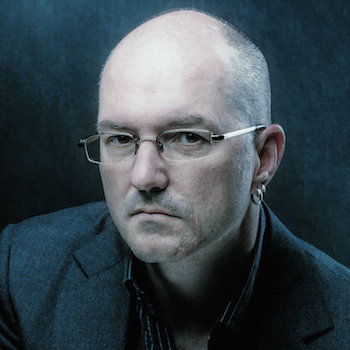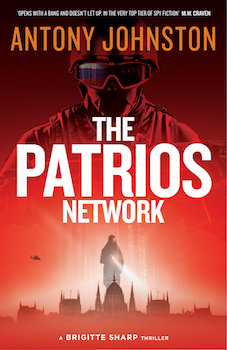

‘Online hate becomes real,’ begins the jacket blurb of The Patrios Network, my third Brigitte Sharp spy thriller.
As part of the last generation to remember life before home computers, and one of the first authors to build a career online, for all its occasional ills I still believe the internet as a whole has been a net good for humanity. It’s enabled amazing things through its technology and application, not least the magazine you’re reading right now.
But, like any tool, it can also be abused and put to terrible ends.
We mustn’t blame the tool. It’s entirely a failure of humanity. After all, a Transit van is undoubtedly a useful thing in our society … that also makes an effective weapon if driven into a crowd of people. But nobody would suggest banning Transits altogether, and we mustn’t fall into the same trap with the internet.
Nevertheless, there are valid questions to be raised about how to deal with online hatred, neofascism, and radicalisation. This is a problem in all communities; don’t assume vulnerable young Muslims are the only people being groomed and recruited online to violent ends. There’s an equally dangerous and obfuscated network (not quite the ‘dark web’, but you won’t stumble across it with a simple google search) of white supremacists spreading lies, propaganda, and hatred in order to recruit impressionable young people.
Some of these movements are spearheaded by adults promoting grievances they know will push the right buttons in young men. Perhaps even more tragically, young men also make their own connections and egg each other on with violent, hateful imagery and genocidal fantasies, all trying to outdo one another and prove their purity within the cause.
There are groups of young boys, some barely teenagers, who venerate dead serial killers and mass shooters such as Anders Breivik and Charles Manson, calling them ‘saints’ and dedicating Nazi imagery to their memory. They buy pistols on the black market and photograph themselves, gun in one hand and noose in the other, their arms clad in bands carrying fascist symbols.
There’s a woman who claims to be the ‘true Queen of Canada’, spreading lies online about heads of state being assassinated on her orders and commanding her followers to reject any authority not stemming from her. It sounds risible, but government staff and officials have been physically threatened and relentlessly harassed in this woman’s name.
QAnon maintains a stranglehold on certain sections of America. Just two weeks ago a man murdered members of his own family after becoming radicalised by this absurd web of conspiracy theories. He was, sadly, far from the first. Many MAGA militia groups operate and organise freely thanks to endorsement by a certain former president.
But don’t think this is a uniquely American problem, either. It’s happening right here in the UK and Europe too – particularly in the states of the former eastern bloc, where significant numbers have low living standards, few prospects, and still feel a post-USSR cultural hangover that bolsters toxic, misogynistic, and racist attitudes.
I know all this because, unpleasant thought it is, it formed much of my research for The Patrios Network, in which reluctant MI6 hacker Brigitte Sharp is tasked with infiltrating such groups to prevent a night of bloodshed across Europe.
Some readers may question how likely that is. Even my editor asked at one point if it was truly feasible that American militia members would answer a call and come to Europe to ‘defend their heritage’. Well, just last month saw news stories of right-wing US militia members, most with zero combat experience, flying to Europe to join the war in Ukraine. And in their case, they hadn’t even been asked.
When online hate becomes real, we must ask ourselves what we can do to stop it festering.
But the internet’s infrastructure was developed by the US military to remain operational even in the event of nuclear war, and this online movement (actually a complex number of separate movements, united by their ultimate goals of anarchy and violence) is no less resilient.
As Bridge points out in The Patrios Network, shutting down a message board is only a temporary inconvenience. The advantages of online anonymity, not to mention the wealth of internet services given away for ‘free’ (normally in exchange for surreptitious surveillance by advertisers) make it child’s play for users to immediately set up a new board elsewhere and pick up where they left off.
Some don’t even use message boards any more. They hang out in live chats on Twitch, use closed Discord forums, and open private Instagram accounts. Some even broadcast openly on TikTok, skirting legality and, if they’re American, perversely shielded by the First Amendment. Many believe they are fighting a holy war, and are determined to use whatever means they can to reach potential followers with their hate-filled lies.
The converse is also true, and the same avenues can be used to reach people with positive and supportive messaging. But it’s easier said than done, and recent years have increasingly proven it’s far easier to spread a message that everything is screwed, and it’s the fault of Jews, Muslims, elite politicians, or transgender people, than to spread a message of diverse solidarity and optimism for a collective future.
I’m no politician, so I don’t pretend to have an easy answer for these problems. But I can shine a light on them. As I say in The Patrios Network’s afterword, if you think the opinions of my fictional online denizens are reprehensible, I’m afraid I can only tell you that the real thing far outstrips whatever my imagination could conjure up.
Antony Johnston is a New York Times bestseller and creator of Atomic Blonde. The Brigitte Sharp thrillers are in development for TV, and The Patrios Network is on sale now, published by Lightning Books.
Also available in the Brigitte Sharp series ...
The Exphoria Code
 CRIME & THRILLER PICK OF THE MONTH — AUDIBLE
CRIME & THRILLER PICK OF THE MONTH — AUDIBLE
“A crackling fuse-wire of a book... Possibly the definitive espionage thriller of the early 21st century” - ALAN MOORE
NEW SPIES. NEW RULES.
MI6 cyber-analyst Brigitte Sharp has spent three years deskbound and in therapy, traumatised after her very first field op went badly wrong and caused the death of a fellow officer. But the murder of her best friend forces Bridge to go undercover inside a top secret military project, to root out a mole — where she uncovers a terrorist plot that threatens everything she has left to live for.
The Tempus Project
 “Forget about Lisbeth Salander, here comes Brigitte Sharp. Unputdownable!” - JOHANA GUSTAWSSON
“Forget about Lisbeth Salander, here comes Brigitte Sharp. Unputdownable!” - JOHANA GUSTAWSSON
BRIDGE IS BACK.
And this time she's battling a series of hacks and ransomware attacks masterminded by a hacker known only as 'Tempus', who targets politicians and government officials with impunity. Realising this campaign is linked to a cyber-attack on the London G20 summit, Bridge is drawn into the dark-web world of cryptocurrencies, Russian hackers and an African rebel militia. She must race against time, to prevent a disaster that could alter the balance of global power forever.